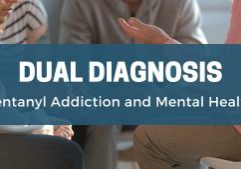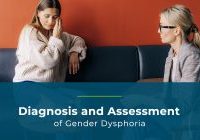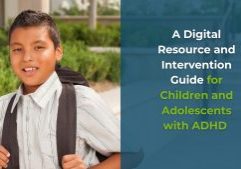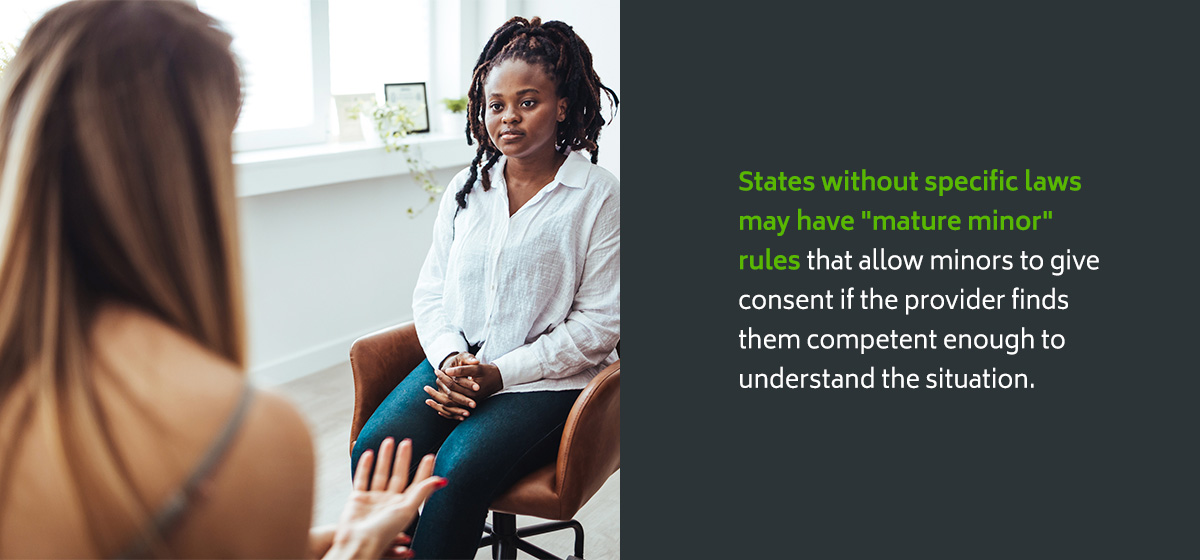
The Age of Consent for
Mental Health Treatment by State
About 17% of youth in the United States had a mental health disorder in 2016, but only half typically receive treatment. For some, this is due to the need to disclose treatment to their parents. While health treatment usually requires informed consent from adults, many states allow minors to give consent for certain types of care.
This option can open up some important doors for accessing confidential care when minors might otherwise forego treatment, such as when therapy involves abuse, sexual activity or other topics that they may not want their parents to know about. These consent laws are essential, but they vary by state and can be difficult to put into practice due to challenges like billing. Anyone treating minors must have a solid understanding of their state's laws and how medical consent affects patient privacy laws and ethics.
Consent for Treatment of a Minor
In most states, 18 is the age of majority, under which health care providers would need consent from the minor's parent or legal guardian. Still, many states have exceptions for sensitive types of treatment, including mental health. Minors can often consent to these at a younger age. The laws vary widely, and outpatient, inpatient and substance abuse treatments can all be treated differently.
When a minor is able to provide consent, they should also be able to receive confidential treatment. Court-emancipated minors are generally able to give consent in all states, and some states allow situationally emancipated minors — such as those who are married or on active military duty — to give consent, too. States without specific laws may have "mature minor" rules that allow minors to give consent if the provider finds them competent enough to understand the situation.
The list below offers general guidelines on the age of medical consent by state for mental health treatment. Note that substance abuse and medical treatment may differ. The information reflects who can give consent for both inpatient and outpatient mental health treatment unless otherwise specified, and "parent" can include guardians or other adults with the authority to grant consent. Most state laws are similar to the findings of this 2015 review, but we've provided sources for any updated legislation:
- Alabama: Minor over 12
- Alaska: No law in place
- Arizona: Parent
- Arkansas: No law in place
- California: Minor over 12
- Colorado: Minor over 12
- Connecticut: Minor for outpatient treatment and parent or minor for inpatient treatment
- Delaware: Parent for inpatient treatment and parent or minor over 14 for outpatient treatment
- District of Columbia: Parent for inpatient treatment and parent or minor for outpatient treatment
- Florida: Parent for inpatient treatment and minor over 13 for outpatient treatment
- Georgia: Parent
- Hawaii: Parent for inpatient treatment and a minor over 14 for outpatient treatment
- Idaho: Parent or minor for outpatient and parent or minor over 14 for inpatient treatment*
- Illinois: Parent for inpatient treatment and a minor over 12 for outpatient treatment
- Indiana: Minor
- Iowa: Minor**
- Kansas: Parent or minor over 14*
- Kentucky: Minor over 16
- Louisiana: Minor
- Maine: Minor
- Maryland: Parent or minor over 12
- Massachusetts: Parent or minor over 16*
- Michigan: Minor over 14 for outpatient care and parent for inpatient care
- Minnesota: Minor over 16
- Mississippi: Minor over 15
- Missouri: Parent
- Montana: Parent or minor over 16
- Nebraska: Parent
- Nevada: Parent or minor
- New Hampshire: Parent or minor
- New Jersey: Parent or minor over 13
- New Mexico: Minor over 14
- New York: Parent or a minor over 16 for inpatient treatment and either a parent or minor for outpatient treatment***
- North Carolina: Parent for inpatient therapy and minor for outpatient therapy
- North Dakota: Parent
- Ohio: Parent for inpatient therapy and minor over 14 for outpatient therapy
- Oklahoma: Minor over 16 for inpatient therapy and parent for outpatient therapy
- Oregon: Parent for inpatient therapy and minor over 14 for outpatient therapy
- Pennsylvania: Parent for inpatient therapy and minor over 14 for outpatient therapy
- Rhode Island: Both a parent and minor
- South Carolina: Minor
- South Dakota: Both parent and minor if under 16
- Tennessee: Minor over 16
- Texas: Minor over 16
- Utah: No law in place
*When minors consent to inpatient treatment, parents are notified.
**In Iowa, the minor and parent must consent to inpatient treatment if the parent wants the treatment.
***In New York, minors can consent to outpatient treatment in certain conditions, including an unavailable parent or guardian, a parent or guardian's denial of clinically appropriate services, and when parental involvement would be detrimental to treatment.
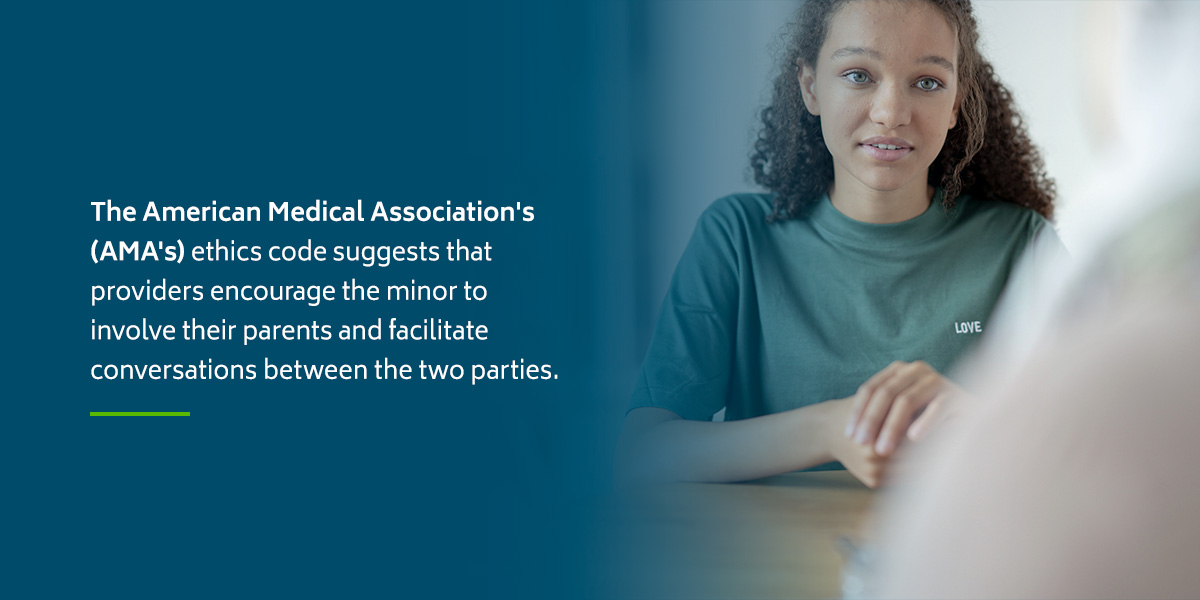
Understanding Consent and Patient Privacy
Consent and patient privacy usually go hand in hand. Minors often want to give consent because they want their treatment to be kept private from their parents or guardians, but the two terms can mean very different things. Informed consent means that the person making the decisions is considered competent, understands the risks associated with treatment, and knows that it is voluntary. It does not guarantee privacy, especially when logistics are at play.
For example, if a minor patient bills their parent's insurance plan, the parent would see the claim in an explanation of benefits (EOB), making it hard to realistically keep treatment private in non-school settings.
Another privacy challenge comes from generalized information that providers may offer. Without explicitly sharing the contents of the visit, a provider might tell a parent that the child might have issues related to certain conditions, like depression or anxiety. If the parent wants more information, some states may allow them full access to treatment records. In others, if a minor is able to provide their consent for mental health services, the parent cannot view records without the patient's permission.
Most states leave room for professional judgment and mandated reporter responsibilities, such as when a minor is a danger to themselves or others. Conversely, a provider can withhold records from a parent or guardian if they believe the child has been or may be in danger due to situations like domestic violence or neglect.
With these nuances in mind, providers should be upfront with minors about the risks of keeping their treatment private, such as insurance statements. The American Medical Association's (AMA's) ethics code suggests that providers encourage minors to involve their parents and facilitate conversations between the two parties. It also suggests that providers address the patient's hesitation and correct any misconceptions.
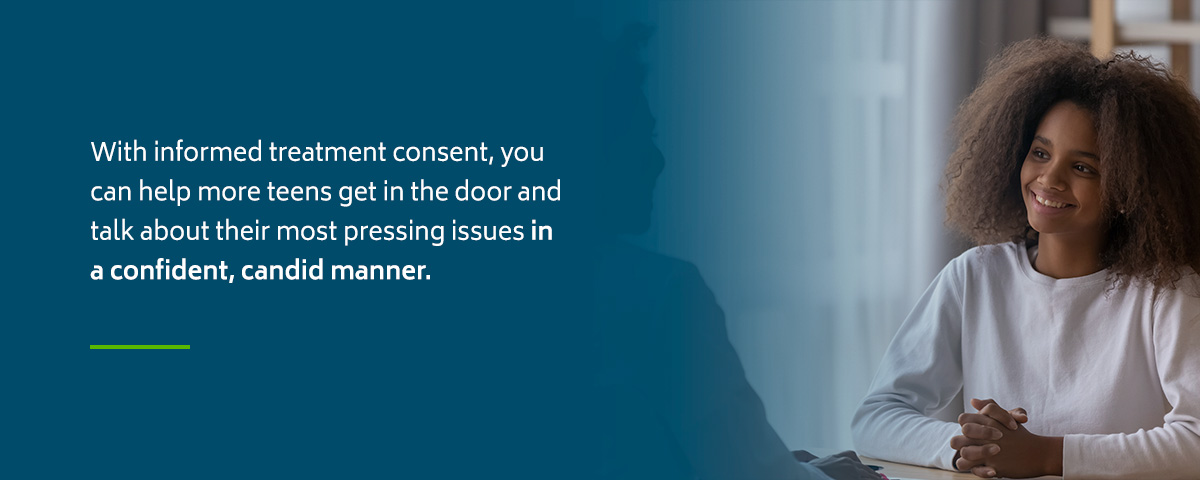
Understanding treatment consent is essential when working with young people. While many parents and guardians have the child's best interests at heart, some do not, and many minors will avoid treatment if they know it won't be kept private. They may not be willing to discuss sensitive topics like abuse or sexual activity, either. With informed treatment consent, you can help more teens get in the door and talk about their most pressing issues in a confident, candid manner.
Still, some providers are hesitant to take a minor's consent in lieu of the consent of a parent. Always consider the challenges, such as recordkeeping and billing, that may need to be disclosed to parents or guardians in your state, as well as your state's penalties for violations. You might want to keep sensitive records separated to avoid accidental disclosure.
Even if you don't need the minor's consent for treatment, it often helps to get their assent, a simple agreement to participate in treatment. It can help them better understand the process and take a more active role in the decision-making process, ideally providing more motivation for the treatment.
Find Out How ICANotes Can Help Your Practice
Your documentation and billing practices are a critical part of meeting minor consent laws for your state and protecting patient privacy. ICANotes is a behavioral health electronic health record (EHR) that is compliant with the Health Insurance Portability and Accountability Act (HIPAA) and offers a range of management tools, like password-protected psychotherapy notes for additional privacy and patient portals, to help you discreetly connect with your patients.
Robust, easy-to-navigate records allow you to include clear documentation about a minor's competency and any factors that contribute to their ability or inability to provide consent. ICANotes has a host of resources to help you navigate informed consent laws and better support your young patients. See ICANotes in action with a free trial today, or reach out to us to learn more.






